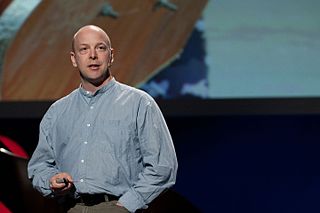A Quote by Chris Jordan
How do we change as a culture, and how do we each individually take responsibility for the one piece of the solution that we are in charge of, and that is our own behavior?
Quote Topics
Related Quotes
To say that it is not our fault does not relieve us of responsibility. However, we may not have polluted the air, but we need to take responsibility, along with others, for cleaning it up. Each of us needs to look at our own behavior. Am I perpetuating and reinforcing the negative messages so pervasive in our culture, or am I seeking to challenge them?
Each of us contributes our own piece to the whole, each in our own way, each in our own time with the gifts and talents that are ours. You ask about possible vehicles for change: question, stand, speak, act. Engage in unruly behavior. Disturb the status quo. Take direct action. Commit civil disobedience. Make art. Build community. Dance. Sing. Farm. Cook. Create something beautiful and then give it away. Find your own monkey wrench and use it with the force of love. Sharpen your pencil. Vote.
With respect to our friends in the [Iraq] region, each has its own system, each will have to make its own judgment as to whether it will change, how fast it will change, and we hope that we can help influence them as to how change comes about and what change might be better for them than other forms of change.
In North America, people get a sense that something is really wrong in government and in our culture. There is a corruption, not only in politics, but of spirit as well, when people are so quick to be violent with one another. I think everybody would like to be able to find a solution to make things better. We have the desire to reform inside of us, and we get frustrated because we don't know how to change things, even if it comes to our own behavior. Sometimes you get frustrated because you don't know how to stop that thing that you know is either hurtful to yourself or someone else.
I used to believe that you could change the culture or behavior of a company. I still believe it's possible, but it is at least a five to ten year process, if you are successful at all. More recently, I have been attracted to the ideas of the behavioralist, Edgar Schein. Schein has argued that you cannot change the culture of a company, but you can use the culture of a company to create change. It's an interesting approach to overcoming resistance. And if you can change how a company does its work, you might eventually be able to change how its people think.
As individuals, and as a society, we can choose to take responsibility for ourselves. In doing so we have to accept that sometimes when things go wrong, it is just an accident. In order to change how we lay blame, we’re going to have to change our over-protective habits; children can only learn to take responsibility when given a chance to assess and mitigate risk for themselves.
The ultimate solution is not in the hands of the government. The solution falls on each and every individual, with guidance from family, friends and community. The #1 responsibility for each of us is to change ourselves with hope that others will follow. This is of greater importance than working on changing the government; that is secondary to promoting a virtuous society. If we can achieve this, then the government will change.
An observer will see the bizarre developments of behavior only in alien cultures, not his own. Nevertheless this is obviously a local and temporary bias. There is no reason to suppose that any one culture has seized upon an eternal sanity and will stand in history as a solitary solution of the human problem. Even the next generation knows better. Our only scientific course is to consider our own culture, so far as we are able, as one example among innumerable others of the variant configurations of human culture.
Our attitude toward our own culture has recently been characterized by two qualities, braggadocio and petulance. Braggadocio - empty boasting of American power, American virtue, American know-how - has dominated our foreign relations now for some decades. Here at home - within the family, so to speak - our attitude to our culture expresses a superficially different spirit, the spirit of petulance. Never before, perhaps, has a culture been so fragmented into groups, each full of its own virtue, each annoyed and irritated at the others.
I really feel concerned about young people within our present culture. Our present culture, we have to change. Change is inevitable and I wasn't raised in our present culture but it has great pressure that as a young person I never had. Material pressure, social pressure, visual pressure, how you look, and I just try to appeal to young people to think for themselves, to be their own person, and to ask questions and also be very attentive to our planet and our environment.








































